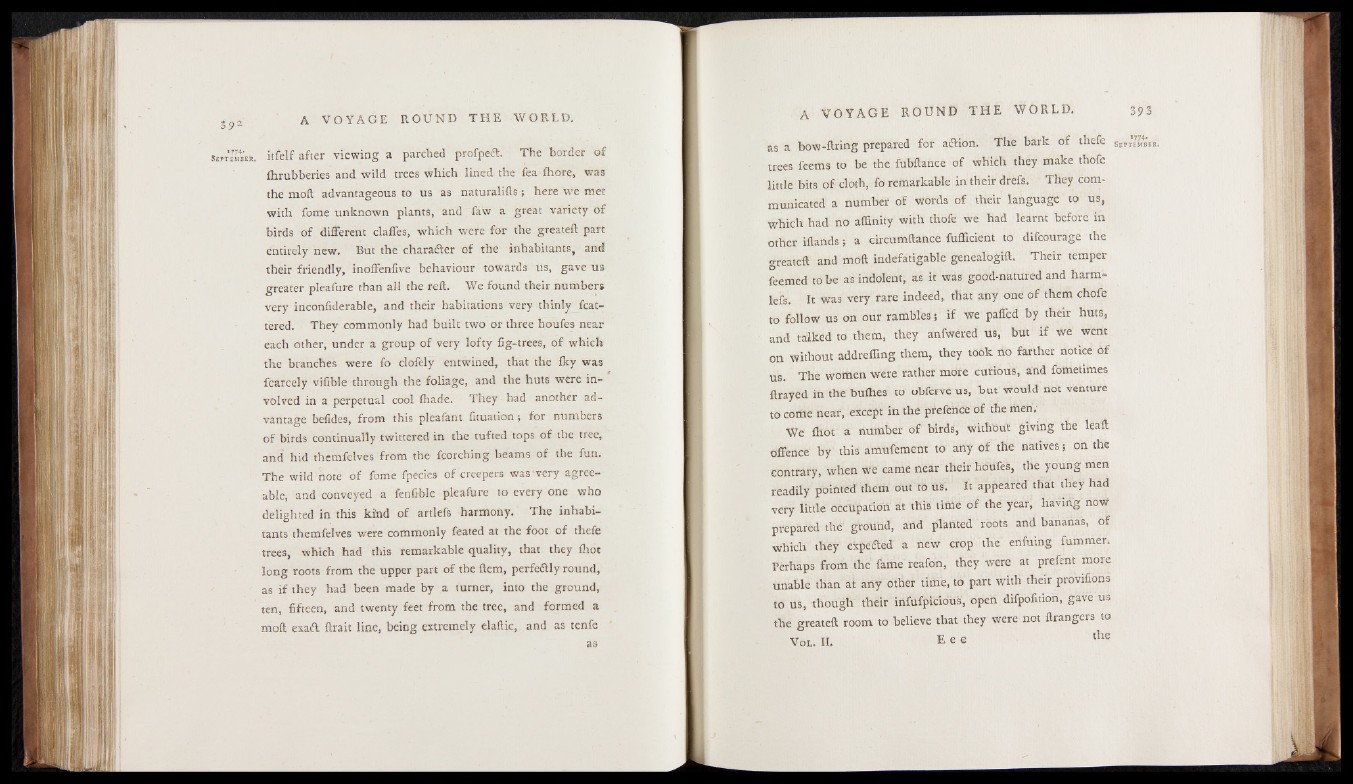
J774-* Sjsptembi itfelf after viewing a parched profpect. The border of
fhrubberies and wild trees which lined the fea fhore, was
the moft advantageous to us as naturalifts ; here we met
with fome unknown plants, and faw a great variety of
birds of different claffes, which were for the greateft part
entirely new. But the character of the inhabitants, and
their friendly, inoffenfive behaviour towards us, gave us
greater pleafure than all the reft. We found their numbers
very inconfiderable, and their habitations very thinly fcat-
tered. They commonly had built two or three houfes near
each other, under a group of very lofty fig-trees, of which
the branches were fo clofely entwined, that the fky was
fcarcely vifible through the foliage, and the huts were involved
in a perpetual cool (hade. They had another advantage
befides, from this pleafant fituation ; for numbers
of birds continually twittered in the tufted tops of the tree,
and hid themfelves from the torching beams of the fun.
The wild note of fome fpecies of creepers was very agreeable,
and conveyed a fenfi-ble pleafure to every one who
delighted in this kind of artlefs harmony. The inhabitants
themfelves were commonly feated at the foot of thefe
trees, which had this remarkable quality, that they foot
long roots from the upper part of the ftem, perfectly round,
as if they had been made by a turner, into the ground,
ten, fifteen, and twenty feet from the tree, and formed a
moft exacft ftrait line, being extremely elaftic, and as tenfe
as
as a bow-ftring prepared for aftion. The bark of thefe
trees feems to be the fubftance of which they make thofe
little bits o f cloth, fo remarkable in their drefs. They communicated
a number of words of their language to us,
which had no affinity with thofe we had learnt before in
other iflands; a circumftance fufficient to difcourage the
greateft and moft indefatigable genealogift. Their temper
feemed to be as indolent, as it was good-natured and harm-
lefs. It was very rare indeed, that any one of them chofe
to follow us on our rambles; if we paffed by their huts,
and talked to them, they anfwered us, but if we went
on without addreffing them, they took no farther notice of
us. The women were rather more curious, and fometimes
ftrayed in the buffies to obferve us, but would not venture
to come near, except in the piefence of the men.
We Ihot a number of birds, without giving the leaft
offence by this amufement to any of the natives; on the
contrary, when we came near their houfes, the young men
readily pointed them out to us'. It appeared that they had
very little occupation at this time of the year, having now
prepared the ground, and planted roots and bananas, of
which they expected a new crop the enfuing fummer.
Perhaps from the fame reafon, they were at prefent more
unable than at any other time, to part with their provifions
to us, though their infufpicious, open difpofition, gave us
the greateft room to believe that they were not grangers to
Vol. II. E e e the
1774"
Septembei